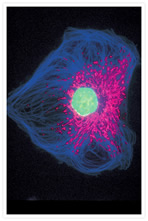Human keratinocytes. Fluorescein concanavalin A and propidium iodide.
Apoptotic human keratinocytes that were fixed with paraformaldehyde and stained with fluorescein concanavalin A (Cat. no. C827). The cells were subsequently permeabilized with acetone, stained with propidium iodide (Cat. no. P1304MP, P3566, P21493) and visualized by confocal laser-scanning microscopy. This photomicrograph clearly shows that the green-fluorescent lectin staining outlines the apoptotic surface blebs, whereas the red-fluorescent propidium iodide stains the interior of the blebs. Image contributed by Livia Casciola-Rosen and Antony Rose, Johns Hopkins University. Reproduced from J Exp Med 179, 1317 (1994) by copyright permission of the Rockefeller University Press.

Related Products
Related Images
A prometaphase muntjac skin fibroblast stained with Alexa Fluor® 350 phalloidin, an anti–a-tubulin antibody and an anti–cdc6 peptide antibody. Go ›

Bovine pulmonary artery endothelial cells (BPAEC). MitoTracker® Red CMXRos, SYTOX® Green nucleic acid stain, biotin-XX goat anti–mouse IgG antibody and Cascade Blue® NeutrAvidin biotin-binding protein. Go ›

1% Agarose gel containing 16S and 23S ribosomal RNA (rRNA). SYBR® Green II RNA gel stain. Go ›

Mouse Anti-Alpha Tubulin Monoclonal Antibody (Cat. No. A11126) Go ›

Agarose gel containing camptothecin-treated HL-60 cells. Go ›

Imaging autophagy in live HeLa cells with CellLight® reagents for mitochondria and lysosomes: Go ›
